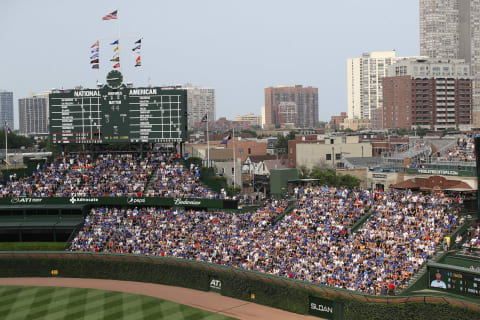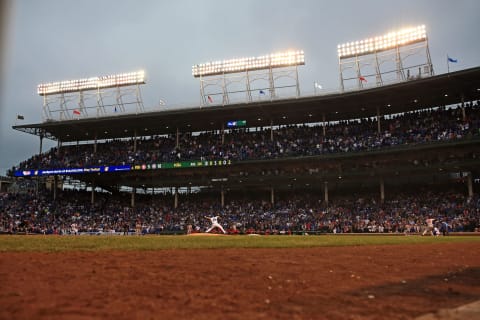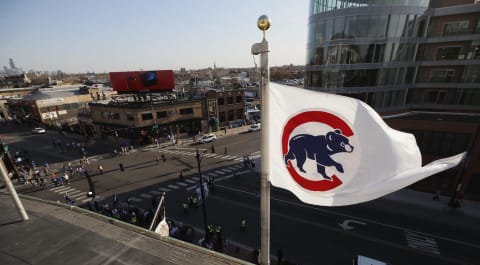Chicago Cubs: The Heroes of Wrigley Series presents Rick Reuschel


An absolute workhorse on the mound, Rick Reuschel was a renaissance man who enjoyed longevity in the big leagues, including a run with the Chicago Cubs.
A farm boy from Quincy, Illinois, Chicago Cubs hurler Rick Reuschel sure had the physique of your stereotypical farmhand. He stood a staunch 6-foot-4 and weighed a hefty 225 pounds.
Despite his portly figure, he proved that bodies can be deceiving when it comes to athletes as he was actually quite agile, often entering games solely as a pinch-runner on days that he didn’t pitch.
“Big Daddy,” as he was affectionately nicknamed, was also a decent hitter at the plate, batting over the Mendoza Line numerous times throughout his career. But Reuschel made his name in baseball as a pitcher and became remembered as one of the best of the 1970s and 1980s.
The Chicago Cubs drafted Reuschel in the third round of the 1970 draft. As the glory days of Ernie Banks, Ron Santo and Billy Williams were coming to an end, Reuschel was just beginning his career. In 1972, after just two years in the minor leagues, the big righty was called up to the Majors.
His rookie season was the last winning season that the Cubs had for 11 seasons. During the time when the team was swimming in mediocrity, the ever-consistent Reuschel was a bright spot for fans at the Friendly Confines.
A complete workhorse on the mound for Chicago, he averaged 36 starts per season during his tenure with the Cubs.
His best season came in 1977, with the Cubs in the midst of a promising pennant run, when he compiled a 20-10 record with a 2.79 ERA over 39 appearances, spanning 252 innings. Reuschel was voted a National League All-Star and finished third in the Cy Young Award voting behind only Philadelphia’s Steve Carlton and Los Angeles’ Tommy John.
Tired of the team’s lack of prosperity in the win column, the front office decided it was time for a full rebuild. Midway through the 1981 campaign, the team traded the 32-year-old Reuschel to the New York Yankees.

Chicago Cubs: Resurgent Reuschel proves he’s still got it late in his career
It was with the Bronx Bombers where Reuschel finally got a taste of the postseason and a chance to pitch in the World Series. He pitched two games against the Los Angeles Dodgers in the ’81 Fall Classic (one in relief) but was ineffective, only able to get through 3 2/3 innings. New York fell in six games and many thought Reuschel’s career was over.
After his lackluster World Series showing, Reuschel remained unsigned throughout the entirety of the 1982 season.
Ahead of 1983, the 34-year-old decided to give it another shot after nearly a year-and-a-half hiatus away from baseball. He found a familiar home, returning to Chicago as a member of the Cubs, who were need of veteran leadership to a young, talented squad.
From 1983-84, Reuschel appeared in 23 games (18 starts) going 6-6 with an ERA over 4.00.
As the Cubs surged in ’84, the National League Eastern Division champions were slated to take on the San Diego Padres in the Championship Series for the NL pennant. However, Reuschel was left off the postseason roster and the Cubs infamously fell to the Padres in five games.
After departing from Chicago a second time, Reuschel was determined to continue pitching in the big leagues.
The 1985 season proved to be a resurgent one for the once cast-aside aging pitcher. Signing with the Pittsburgh Pirates in the offseason, the 36-year-old went 14-8 with a 2.27 ERA and earned the Comeback Player of the Year Award.
While the lowly Pirates finished in last play in the National League East during his two full seasons in Pittsburgh, Reuschel won 30 games with a 3.04 ERA. With his career renaissance in full swing, Reuschel became a hot commodity for contending teams. In late 1987, the San Francisco Giants traded for Reuschel and he immediately became the ace of the eventual Western Division champions.
In 1988, he started a league-leading 36 games on his way to a 19-11 record with a 3.12 ERA over 245 innings.
In 1989, he became an All-Star for the second time in his career at age 40. He finished the season with a 17-8 record and a 2.94 ERA, helping lead the Giants to a National League Championship Series victory over his former team, the Chicago Cubs.
Unfortunately, Reuschel and the Giants fell short of a ring as they were swept in the World Series against the Oakland Athletics. He pitched for two more years, both with San Francisco, before retiring following the 1991 season at the age of 42.

Chicago Cubs: Is Reuschel a Cooperstown snub?
Rick Reuschel’s career spanned 19 seasons where he compiled a 214-191 record with 102 complete games (19 percent of his career starts), two Gold Glove Awards and was twice an All-Star.
More from Cubbies Crib
- Cubs: Adrian Sampson is forcing his way into the conversation
- Projecting the Chicago Cubs bullpen to open the 2023 season
- Cubs fans are beginning to see the light at the end of the tunnel
- Justin Steele has evolved into a frontline starter for the Cubs
- The future of first base is murky right now for the Cubs
Twelve of those 19 seasons were spent on the North Side of Chicago where he won a total of 135 games (15 percent of the team’s victories from 1972-81 and 1983-84), pitched in 358 total games, started 343 of them (2nd in franchise history) and tossed 2290 1/3 innings (6th). His 48.3 bWAR is cemented as second in club history only behind Fergie Jenkins (52.9).
In 1997, his first year of eligibility on the Major League Baseball Hall of Fame ballot, Reuschel received only 0.4 percent of the votes, falling well short of the required amount for future consideration.
Rick Reuschel’s career record is what probably hindered his Hall chances and made voters bypass his consideration so quickly. However, that’s not the only statistic that should be taken into account when really analyzing his career performance.
Pitching on mostly bottom-dwelling teams for the majority of his career, Reuschel’s overall record probably suffered which caused voters to overlook the notoriety he deserved. He was one of the most solid and consistent pitchers of his time.
His career bWAR is 69.7, which is actually higher than other Cooperstown notables such as Don Drysdale, Don Sutton, John Smoltz, Juan Marichal, and 2019 inductee, the late, great Roy Halladay.
Next. Five guys you forgot actually played for the Cubs. dark
Cooperstown may have overlooked his success, longevity, and consistency but, to Cub fans, “Big Daddy” will forever be remembered as a Hero of Wrigley.